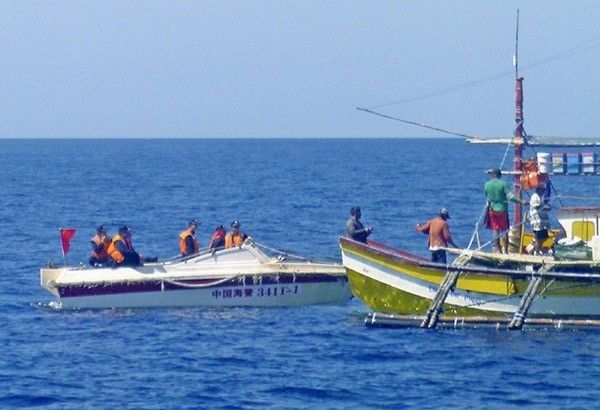What’s happening to Filipino fishermen in the South China Sea?

At about the same time as a senior Philippine military officer denied reports Filipino fishermen were being harassed by Chinese security forces in the vicinity of Scarborough or Panatag Shoal in the West Philippine Sea, an even more senior US admiral said the fishermen were being regularly harassed and intimidated. Jose Katigbak specially for The Philippine Star.
Adm. Philip Davidson, head of the US Indo-Pacific Command, told a House armed services committee on Wednesday that Chinese coast guard vessels now under the command of the Central Military Commission “regularly harass and intimidate fishing vessels from our treaty ally, the Philippines, operating near Scarborough Reef, as well as the fishing fleets of other regional nations.”
In a written statement to the committee meeting here to discuss the Indo-Pacific region, the US Navy commander said contrary to international law, Beijing has continued militarizing disputed territory in the South China Sea by employing advanced military systems that further enhance the People’s Liberation Army power projection capabilities, including missiles and electronic jammers.
On multiple occasions, Beijing has landed military transport aircraft on the Spratly Islands and long-range bombers on the Paracel Islands, he said.
Additionally, Chinese Coast Guard vessels regularly harass and intimidate fishing vessels from the Philippines.
Earlier Lt. Gen. Emmanuel Salamat, commander of AFP’s Northern Luzon Command (Nolcom), said there have been no reports of Filipino fishermen being harassed by the Chinese in the vicinity of Panatag.
The Nolcom commander added that Navy and Coast Guard ships regularly patrol the country’s northern maritime borders to ensure freedom of navigation in the area.
Randall Schriver, assistant secretary for Indo-Pacific Security Affairs Office at the US Defense Department, told the House committee Beijing’s intentions in the South China Sea were not benign.
“China continues to militarize disputed features in the South China Sea and has also delivered coastal defense cruise missiles (CDCM) and long-range surface-to-air missile to Spratly Islands outposts, a clear sign that its intentions are not benign,” he said.
In Manila, the Duterte administration has distanced itself from a complaint filed with the International Criminal Court (ICC) by former foreign affairs chief Albert del Rosario and former ombudsman Conchita Carpio-Morales against Chinese President Xi Jinping over China’s aggressive actions in the South China Sea.
President Duterte mentioned the complaint during his meeting with Communist Party of China international department minister Song Tao last Wednesday in Davao City, but a Palace statement stressed his administration “had no participation in such activity.”
“We cannot stop people from just filing cases,” Duterte was quoted in the statement as saying.
Duterte and Song also discussed issues that he thought would further strengthen the relationship between Manila and Beijing, according to the Palace statement.
The Philippine leader thanked the Chinese government for the “vibrant trade relationship” between the two countries and cited China’s “relentless support” for his administration’s “Build Build Build” infrastructure program.
Song assured Duterte that China is ready to assist the Philippines in its effort to improve the lives of its citizens.
“If there (is) a need of assistance in improving the people’s lives, China is willing to help,” the Palace statement quoted Song as saying.
Song said the Chinese government is also looking forward to welcoming Duterte to China next month. The President is expected to attend the second Belt and Road forum in China in April.
Proper mechanism
Meanwhile, Philippine Ambassador to China Chito Sta. Romana said any complaint regarding alleged Chinese harassment of Filipino fishermen may be raised by Duterte through the Bilateral Consultative Mechanism (BCM), which meets every six months.
The President is expected to bring the matter up with Xi on the sidelines of the Belt and Road Forum in Beijing.
“Regarding this issue, we have a mechanism for this. If there is actual harassment that is confirmed by the Philippine authorities, through the National Task Force on the West Philippine Sea, it is raised through diplomatic channels,” Sta. Romana said in an interview on ANC on Wednesday.
“We raise it at the Bilateral Consultative Mechanism. And this is the mechanism we use to tell the Chinese, face to face, about a particular issue,” he added.
With Alexis Romero, Pia Lee-Brago